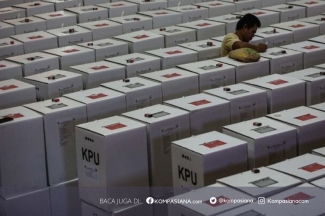War has always been an interesting thing for me to research. Since I was a kid, I always have been reading military history. There's just something about war that is, how should I put it, a bit attractive to me.
The notion that peoples are willing to die for their own country and even kill other peoples tends to overwhelmed a lot of people's mind. "Are humans pre-destined to kill each others ?", "is conflict inevitable ?", etc. I also sometimes found myself wondering why do peoples do that too. Would I be willing to die if my country is at war ? Would I be willing to kill in a war ? This are the questions experts try to answers for centuries. Clausewitz is one of them.
Carl von Clausewitz was a Prussian general that was born in 1780, Kingdom of Prussia. Clausewitz had the lucky (or rather, unlucky) circumstance of living in one of the most important era in human history. In 1790s, Kingdom of France was shaken by a revolution that eventually changed the whole fabric of, not just France itself, but also the whole world. The revolutionaries overthrew the Bourbon monarchy and voted with a majority vote to executed the former Bourbon monarch by guillotine.
The whole Europe was shocked and declare war on the revolutionaries. One of those kingdoms was Clausewitz's homeland. Naturally, Clausewitz fought in the war against French Republic and when Napoleon assumed power in France, he also fought in the Napoleonic Wars too. The war gave Clausewitz a whole new perspective. Before the French Revolution, Prussia had the most professional land army in Europe. Prussia was still proud of the achievement of its previous monarch, King Frederick II.
However, all this facade suddenly broken when the Prussians suffered defeat at the hand of the (French) Revolutionary Army. When the whole Europe declared war on France, the revolutionaries panic and enacted the famous Levee en masse. Overnight, this decree easily gave the new state an army of 800,000 men. A number unheard of during that era. Not only this revolutionary army suddenly outnumbers the then-largest army in Europe, it also defeated it. The Revolutionary Army, an army mostly consisted of peasant farmers, defeated the most professional army in Europe (Knapp, 2006). This form of war was new to Clausewitz. Previously, the people never really participated in a war.
In a "Cabinet war", a war is mostly the business of the elite aristocracy with no input from the lower strata. The army tends to be small and the war goal is quite limited. However, that era is clearly has come to a close as we can see, the Revolutionary Army numbered almost a million and the entire population participated in the war (Cederman, 2011).
After the war, Clausewitz set out to write his experiences in the war. In his book, Vom Kriege, he write that "War is the continuation of Politics by other means". There are some truths behind these words. He found that the French Revolution gave birth to a new form of war. In his book, Clausewitz set out a paradigm showing the trinity relationship between war and the people.
This Revolution made the entire population as citizens of a nation, not just a subject of a monarch. As the Revolution gave the people new political rights, the people also found out that they now have new political obligations to do. All citizens must defend the political nation because they are part of the nation. What I'm trying to discuss in here is how human psychology affects diplomacy. Clausewitz tried to emphasized the force of morale in politics and warfare. He made a clear general principle that says in a war between 2 countries, the one who has the more willpower will eventually prevails (Clausewitz, 1989).
Main Argument
As already mentioned before, I want to talk about how human psychology could affect politics and warfare. Often time, i observed a lot of people I met in my major, International Relations, often have this perception that politics is the realm of human rationality. That political actor (could it be state or individual) often act based on rational decision. But I beg to differ. Through this paper, I would like to give a new perspective on the nature of politics and its actors. To put it simply, I would like to disagree with the statement a lot of my colleagues have that politics is the realm of human rationality and anyone who participate in politics based their act on rational thinking. And by that, I wasn't talking about the old-age "Realist vs Liberal" paradigm.
No, I believe that in our current age, politics have evolved to become Non-Rational in general, regardless of what paradigm you adopted. Now, some people would start to wonder what I meant by this ? This statement might contradicts what some people had learned in their academia. Some few people could probably tell what I'm heading with this. The problem I found with a lot of colleagues whenever we're talking about politics is that a lack of "macro-level" perspective in the epoch of politics. Few of my colleagues know the esoteric meanings behind our politics. I'm using the French Revolution as an example a lot in here because it truly is a leap in modern politics.
